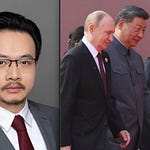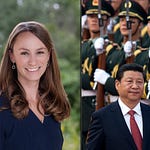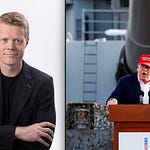Jersey Lee
Welcome back to Pacific Polarity. Today, we’re speaking with Professor James Laurenceson. He is an economist, educator, analyst, and researcher. He is director of the Australia-China Relations Institute at the University of Technology, Sydney, also known as UTS-ACRI, Australia’s first and only research institute devoted to studying the relationship between Australia and China. He conducts research that seeks to inform Australia’s engagement with China. Professor Laurenceson, great to have you on.
James Laurenceson
Great to be with you, Jersey. Thanks for the invitation.
Jersey Lee
As I understand, you just came back last week from the China International Import Expo, which is more usually known as CIIE—I think it’s one of the first time I’ve pronounced its full name out in English. And that was in Shanghai. Could you give an overview of the mood on the ground? And what was your biggest takeaway?
James Laurenceson
Yeah, that was my third trip this year. And I’m going off again in a couple of weeks. Look, CIIE was buzzing, but I’m not going to pretend—CIIE is not Shanghai and Shanghai is not China, right? This is a very small microcosm of what’s going on in the broader economy. So while CIIE was buzzing, I think it’s still true to say that broadly China’s economy remains fairly sluggish, but not collapsing. And that’s an important distinction, right?
And we know why it’s sluggish; much of the sluggishness owes to an ongoing slump in the real estate sector. And that slump looks like it’s still got a fair way to run. So I don’t see any major bounce back in China’s economy in the near future. Longer term, Jersey, there is two ways of reading that property sector slump. I mean, clearly it’s a headwind now, but longer term, is it such a bad thing? I’m actually moving more towards the view that it’s probably a pretty good thing long term.
We shouldn’t forget that back in 2021, when this whole process started, it was as a result of a deliberate choice by Chinese economic authorities, and house prices in China were getting out of control, particularly in tier one cities and tier two cities, so it was becoming increasingly difficult for the average Chinese resident to afford to buy a home. So, if we can inject some more affordability into China’s property sector, and that means that in the future, Chinese households won’t be paying as large a part of their income on mortgages. That means they’ll have more money for other things. Meanwhile, more of the Chinese economy’s resources flows into other sectors of the economy other than putting up residential apartment buildings. Well, that’s perhaps not a bad thing. How about I stop there?
Jersey Lee
So obviously, one of the ways that the Chinese government is trying to deal or counteract—meet the moment, given the property slump you were talking about, is to go harder in manufacturing. And that’s what brought us to what’s known nowadays as the China Shock 2.0, where there was a flood of Chinese exports after COVID started. And so that’s, I guess, the flip side of the CIIE, which is supposed to be about Chinese imports, but what the world is focusing a lot of its attention on is China’s strength in exports, and the concern that it’s bringing out to the world.
Perhaps we can look a bit further into how this looks from the standpoint of China. because China’s export dominance is actually to some extent the flip side of their consumption weakness. While there’s been some progress against involution, or the rat race, the net effect so far over the past few months just seems to be shaving economic growth without necessarily boosting domestic demand just yet. And in the leadup to last month’s fourth plenum, I saw some pretty serious suggestions that China might consider changing the incentive structure for local government officials, so they are promoted for boosting consumption instead of attracting new investment, new manufacturing that’s just going to contribute to this involution, this rat race; but that doesn’t seem to have occurred. So what’s the state of play there? I guess this is a pretty big question on the overall Chinese economy and what perhaps Zhongnanhai is thinking right now.
James Laurenceson
Yeah, well, I’m certainly not going to be one of those people who makes any claim to or even try to pretend that that’s the case. Look, Jersey, I think I’ll keep my answer pretty brief because, while the Chinese economy is actually my academic home, the truth is, since I moved to UTS 10 years ago, I have been more focused on the Australia-China economic and broader relationship. And look, it’s a complicated and debated area, right? I’m still familiar enough with the area to know that.
There’s debates about just how lagging consumption is in fact. And it’s also true—I completely accept that much investment in the Chinese economy really does improve the amenity Chinese households have available to them, when we think of the transportation networks, public parks, and so on, and none of that is showing up as consumption spending.
I think we’ve also, even an economist like me, we’ve got to be a little bit humble here. There’s only so much of economic development we understand. Clearly the Chinese authorities believe that they can create a virtuous income circle that starts with investment. I’m a bit skeptical of that, but I don’t suppose we should rule it out.
The lagging consumption phenomenon in China isn’t remotely new. There’s this great quote—I’m sure you’ve probably heard of it, Jersey—Chinese Premier Wen Jiabao in 2007, where he lamented that the Chinese economy was still too dependent on exports and investment, and not enough on domestic consumption. So we’re coming up with the 20th anniversary of that, and we’re still talking about it.
I think the key challenge, of course, is the political economy in China acts as a powerful constraint on switching growth models, away from investment led growth, often undertaken by state and enterprises, and putting a larger share of the Chinese economic pie in the hands of households. And so far, not even Xi Jinping, the most powerful leader since Mao, as we all like to say, not even he’s been able to engineer that shift; or perhaps in Xi’s case, it’s more that he’s not interested in doing that. And he still thinks that he can keep China moving up the value chain and Chinese incomes rising from investment driven growth model. So let’s wait and see if he’s right.
Jersey Lee
When the Trump administration rolled out its Liberation Day tariffs, I remember reading back then a curious quote, I forgot whether by Jim Chalmers or Don Farrell, but someone senior at the Albanese government, and they were saying that they were on the lookout for evidence of dumping, products that were originally intended to go to the US, and now they might be dumped elsewhere. And actually that was also something that came up, I remember, during the April conversations between the EU and China about how to deal with this US Liberation Day tariffs, where the EU were telling China that, you know, we don’t want you to sell us additional stuff that may have been displaced by the US. So could you talk a bit about the current dynamics of this?
James Laurenceson
Yeah. Look, the U.S. is obviously the country that’s putting up the barriers most to Chinese exports. For a country like Australia… The definition of dumping is not just that a country is selling goods below the cost of production, but also it’s causing a material damage to the domestic industry.
Now, when it comes to Australia and China, the two economies, they are the most complementary economies in the world. What I mean by that, for example, is that if China wants to sell us a whole bunch of cheap cars and electric vehicles, we’ll take it; we’ll be delighted because that’s a big win for our consumers, and we don’t have a domestic car manufacturing industry. Now, that’s obviously not true in the US and Europe and Japan and so on. So the dumping issue, I do think, is a less lively debate in Australia compared with many other parts of the world.
And I also note, I don’t think the rest of the world is responding to Chinese exports like the U.S. is. Again, let’s talk about cars, I think it’s the good one. The EU, of course, as your listeners would know, the EU has its own anti-dumping tariffs on Chinese electric vehicles. But they’re pretty modest, they’re in the range of 20% to 40%, where the US just didn’t even pretend to do a WTO-compliant investigation, just went straight to 100%, basically locking them out of the market. While the EU is certainly sensitive to cheap Chinese imports, I don’t think they’re responding in the same way as the US, and I don’t think many other countries are. The best data I saw recently was that, of the Chinese exports that have been locked out of the US market, around 80% of those exports have found an alternative market. So far, the Chinese economy and the rest of the world seem to be managing the situation. But sure, if we keep going down this path, you’d have to think we’re going to get to a point sometime where more and more countries are going to put up the shutters.
Jersey Lee
One thing you mentioned was the strong complementarity between the Chinese and Australian economy. And that’s something that you mentioned a few times as well previously, specifically arguing that there’s kind of a mutual interdependence going on, which perhaps led to China recognising, as you argue, that it couldn’t coerce Australia, as it tried to do around 2020. However, we also see China making various efforts to increase domestic circulation and reducing dependence on foreign inputs. So I’m wondering if these clear efforts by China to reduce its dependence, particularly perhaps on Australia, whether that might change that equation. We see, for example, China trying to diversify iron ore imports and then driving a harder bargain in ongoing negotiation with BHP.
James Laurenceson
Yeah, still, I think where China is making most progress in diversifying away from foreign inputs is in manufacturing supply chains, and as it moves up towards the high value added part of those manufacturing supply chains—I guess what I’m saying, I think it’s the Americans, the Japanese, the Koreans, the Germans that are facing the most stiff competition from Chinese domestic production.
Now, of course, China’s also keen to have more diversified supply chains throughout, including upstream, closer or at the mine site. But that’s not easy to do. For example, if we’re talking iron ore, I remember back in 2008, Chinese steel importers were extremely bitter about the high price that they were paying for Australian iron ore, and so they set about trying to diversify those iron ore supply chains. At the time, about 60% of China’s iron ore imports came from Australia. So these economic drivers of trade, whether you’re talking about China, whether you’re talking about the US, whether you talk about Australia, they’re really hard to shift.
And at least speaking from an Australian perspective, I think it’s going to be pretty hard to dislodge Australian iron ore exporters, because they are the lowest cost producers. So what tends to happen, and we’ve seen this many times previously, is if the world price of iron ore starts to fall, actually the suppliers that get knocked out first are Chinese domestic suppliers and those from other countries that are operating higher cost mine sites. In fact, a larger proportion of China’s imports can actually come from Australia in those circumstances.
I think we’ve got to be realistic and recognise that Beijing is trying to diversify supply chains, whether it’s upstream iron ore for Australia or for the Germans and the Japanese. They have to worry about more downstream. But still, just because Beijing wants it or Xi Jinping wants it, it doesn’t mean it’s easy. Far from it.
Jersey Lee
Well, you present, I guess, a pretty optimistic scenario for Australia. But I guess for Australia, they can’t just rely on assuming that China would not be able to do this. So what can Australia proactively do to either shore up its moats, as Warren Buffett likes to say, or to be a better place to—there’s a lot of debate about this: on the one hand, you could argue for Australia trying to diversify export partners; on the other hand, you could argue for Australia actively doing something to stay ahead of China’s efforts to diversify its trade partners. So what do you think Australia should do?
James Laurenceson
When it comes to China, I actually think our trade is relatively diversified already. Let’s be clear on the facts, right? We all know about iron ore, iron ore gets all the headlines, and I get it, it’s a $100 billion trade, fine. But China’s not just our largest customer for iron ore or minerals, generally. It’s also our largest market for fuels. It’s our largest market for crops. It’s our largest market for livestock products. It’s our largest market for education. It’s our largest market for tourism. So you actually do have quite a whole bunch of goods that we’re selling to China.
Now, you’d certainly be right in saying, well, hang on, most of those, other than the services, are primary goods. And I would readily agree with that point. But that then comes back to a more fundamental issue. That’s what Australia sells to every country. It’s not about China. In fact, I was just looking at the data. You might want to fact check me on this, but I was looking at Australia’s exports to Korea specifically; two thirds of our total goods exports to Korea was just one good, coal. And I think coal accounts for about half of our exports to India.
So I’m actually far more nervous about Australia’s trade relationship with plenty of other countries going into the future rather than one with China. If Australia wants to get serious about diversification, and I’m all for that, no problem, but I don’t think we should obsess about markets, I think we should obsess about the number of goods that were actually globally competitive in producing.
Jersey Lee
Well, you seem to want to skip over the topic of iron ore, but I just wanted to ask one more question on that, because there was a bit of fake news initially that BHP may have already acquiesced to China’s demand for settlement in RMB. It seemed to have not happened, but there seems to be no real clarification. Recently news seems to have died down, but there’s still no resolution. So what’s your understanding of the latest situation, and what do you think would be a good and realistic settling point for this particular negotiation?
James Laurenceson
Yeah, Jersey, you call it fake news, and I don’t have any evidence to rebut you with. I was surprised by just how much attention the issue got, given how weakly it was sourced. So I probably wouldn’t go as far as you in calling it fake news, but when people have asked me, I’ve certainly been very cautious that, as far as I know, not a single Australian media, reputable Australian media outlet has actually been able to confirm what went on. Given that, I’m reluctant to say too much.
We know what BHP says, and they just say it’s part of hard nose commercial negotiations. And certainly that’s not remotely unusual. I don’t think we need to worry about BHP being pushed around, this is a huge multinational company that’s engaged in hard-nosed commercial negotiations routinely. I think they’ll be just fine. They’ll make concessions where they need to make concessions. So will Chinese steel importers. And the balance of leverage between the buyer and the seller, that waxes and wanes over time. I think it’s true to say that, if you project out five, ten years into the future, I think it’s fair to say that the balance of leverage will probably shift towards Chinese steel importers, but that’s got nothing to do with politics or economic coercion, that’s got everything to do with commercial negotiations and economic realities on the ground. BHP will be fine.
Jersey Lee
Let’s move on to a more global landscape. Recently, a different ore that comes out of Australia, or a different type of ore that comes out of Australia, has gotten a lot of attention. Obviously when China flexed its muscle on rare earth export controls, that got America’s attention, and that arguably led to a much smoother visit by Australia’s Prime Minister Albanese to Washington last month. A lot has been made about this from the Western perspective. But I’m wondering, since you just came back from China, how are the Chinese thinking about this? Because there’s an argument that they may have used up a key leverage point. Maybe there’s an argument to be made that this was a good time to use it. And maybe there’s an argument to be made that, actually, this wasn’t a great use of such a key leverage point or such a key card that China had up their sleeve.
James Laurenceson
I won’t insult you or your listeners and pretend to be able to give you a deep insight into how Chinese authorities are thinking about it. Can I start off by making a general point though? And that is that economic coercion is really, really difficult. The overwhelming volume of evidence makes that clear. So for example, when Beijing weaponised trade against Australia in 2020, did that cause Canberra to capitulate? No. As when Washington has weaponised trade against China, you know, over the last little while, has that caused Beijing to capitulate? No. So it sounds conceptually simple, but the practicalities of it are actually quite difficult. And in large part, that’s because it’s oftentimes pretty easy to defend.
So, again—I don’t want to get sidetracked here, and I know you don’t want to—but when Beijing said to Australia, we don’t want your coal and cotton and barley, our local producers largely shrug their shoulders, because they’re selling into competitive and open global markets. So if Beijing didn’t want it, fine. We’ve got plenty of other countries that do. So that would be the general point I’d make.
Now, was it a good smart decision by Beijing? I don’t know what the Chinese authorities are thinking, but certainly I have read commentaries from Chinese academics who have raised that question, about whether it’s actually a smart move in the long run. For example, if you ask me whether US export controls against China are a smart move in the long run, I would feel quite confident in telling you, no, I don’t think it is. I think it’s pretty dumb, actually. And in fact, a lot of American commentators have made that same point. I have heard some of the same discussion from Chinese commentators about the most recent moves. So look, I think there is some satisfaction in China that those export controls around rare earths caused Washington to blink, sure. But longer term, at least amongst the academic community, I think there is some scepticism about whether that’s actually a smart course of action. But within the Chinese government, no idea.
Jersey Lee
Recently, when Trump visited Malaysia for the ASEAN summit, the red carpet was rolled out for him, both literally and figuratively. Because while there, Trump signed a number of trade agreements where he basically got, as far as I could tell, almost everything he wanted. And also two critical minerals MOUs, that even included specific provisions that would effectively restrict Chinese involvement. He also presided over the signing of the perhaps now dead Thailand-Cambodia peace deal, along with Malaysian Prime Minister Anwar Ibrahim, where it seemed that only the Cambodian Prime Minister even bothered to mention that China was involved in this at all.
And, you know, the reason I mentioned Anwar Ibrahim is because his role seemed particularly notable to me, given the general impression that he is somewhat more U.S. sceptical and China curious; instead, it looked like he basically rolled over on trade and critical minerals negotiations—and he came under domestic fire for doing so—he also neglected to thank China for bringing Thailand and Cambodia to the negotiation table. So in your conversations, were the Chinese surprised by how little resistance ASEAN and perhaps Malaysia in particular displayed against U.S. pressure? And did this change China’s calculus for approaching the broader competition and trade war with the U.S.?
James Laurenceson
Yeah, I’m actually off to Malaysia in a week and a half. I wish we were having a conversation after that when I’ve actually had a chance to speak to some Malaysian colleagues.
My sense is that I wouldn’t get too excited about an MOU. I tend to believe a lot of trade and investment decisions are made on the basis of economic fundamentals rather than what two governments release as an MOU or a joint statement. I would be pretty shocked if Malaysia or ASEAN at large made a decisive move away from China towards the US, because I just don’t think the US is ASEAN’s economic future. My understanding is, I think ASEAN’s two-way trade with China now is almost double that of its trade with the US. I don’t think there’s going to be any... I mean, ASEAN is going to be happy to work with the US more, no doubt. But if that comes at the cost, or if that means less economic engagement with China, I’d be pretty surprised if that’s the direction we’re heading in.
Coming back to Australia, this is what I know better, you would think that of all the countries in the region, Australia is probably one of the most amenable to working more closely with the US. And we just signed a critical minerals deal, whatever the heck that means, MOU with the US. But practically, what does it mean for Australian trade policy? Well, we saw earlier this year, when there was some grumblings out of Washington that we should curtail our trade relationship with China, our trade minister immediately went on the front foot and said, we don’t want to trade less with China. We want to trade more with China. And then to make the point, he backed it up, and said that we will make decisions in our national interest, not on the basis of what the Americans may or may not want. Close quote.
So in the region, I don’t get any sense that any country is hard choosing China or the U.S., right? And I know from the polling we do at the Australia-China Relations Institute, most Australians actually believe that you can run a constructive relationship with both countries. So I think the political momentum, at least in Australia, is that our security alliance with the US shouldn’t mean that we have to curtail our economic relationship with China. But as for Malaysia, I’ll let you know in a couple of weeks.
Jersey Lee
Well, I look forward to that. I guess the point I was asking wasn’t specific MOUs or anything, but it’s just that there were lots of predictions, particularly after Liberation Day, that Trump might be starting to make countries, particularly in Southeast Asia, start to question their long-term strategic alignment, which might have some impact on U.S. influence and their willingness to engage with the U.S. I’m just saying that that really did not seem to have panned out. The concessions that Trump got surprised a lot of analysts. So I’m just wondering whether this might actually make a case that there might be something to Trump’s foreign policy approach, that all those analysts saying, “oh, you cannot bully Southeast Asian countries, they don’t do foreign policy this way, they don’t respond well to this style of foreign policy”, are those lines of argument just bunk or have a certain agenda in mind?
James Laurenceson
I think certainly ASEAN countries want to protect their interests, and economic engagement with the US is one of their interests. So if they can make some concessions, particularly if they’re largely tokenistic and don’t lock them into exclusive economic arrangements with the US, then I imagine most ASEAN leaders would be pretty comfortable with that.
In the past, what we’ve heard is ASEAN leaders are reluctant to say anything negative about China because they’re worried that China might punish them economically. And so now, if they’re worried that Donald Trump and the US might threaten them, they’ll be keen to take some of the heat out of it.
But again, I think there’s a very big difference between, maybe not saying something that you might have said a couple of years ago or signing a joint statement or an MOU, there’s that on the one hand. And then on the other hand, there’s a broad trajectory of your international economic and trade policy. And I’m still not seeing any dramatic moves in that second rule.
Jersey Lee
Moving back to Australia, this year marks the 10th anniversary of the China-Australia Free Trade Agreement, or ChAFTA. And I understand that that was part of your recent trip to China. It was signed under the conservative Tony Abbott government, which had lavished praise on this agreement a decade ago; I can’t imagine too many people involved in that praising ChAFTA these days. A lot of other things have also changed. And right now, the Australian government is seeking submission for review into the agreement. Without prejudicing any submission that UTS or ACRI may or may not make, what do you think should be updated? You’re also welcome to comment on the various changes that have occurred over the past decade.
James Laurenceson
Yeah, Jersey, you said you couldn’t imagine too many people on Tony Abbott’s side of politics, the conservative Liberal National Party Coalition praising ChAFTA these days. Well, I’m not so sure about that. Just last year, we hosted Simon Birmingham, who was then the coalition’s trade minister, and he remained very supportive of ChAFTA. In fact, the former leader of the opposition, Peter Dutton, who’s a China hawk in the defence realm, when he was asked about trade with China, he said he wanted to double it. So in Australia, it’s unusual, there’s actually a bipartisan political consensus that more trade with China is in Australia’s national interest. And it’s not a very risky position because when you ask, when you poll the Australian public, that’s their view too.
So speaking specifically about ChAFTA, next week, we are going to be releasing our new annual survey of Australian public opinion towards China and the Australia-China relationship. We’ve got a question in there about the China-Australia Free Trade Agreement. When you present Australians with the statement, “the China-Australia Free Trade Agreement has been beneficial to Australia’s national interest”, I can tell you that 60% of Australians agree with that statement. Just 8%, less than 10%, 8% disagree with that statement, and the balance is neutral. So in fact, the Australian public is not like the American public. We actually are pretty supportive of more trade with China.
Probably the other thing I’d say on the trade front when it comes to Australia, is that Penny Wong, our foreign minister, has this line where she says that trade is not just good for prosperity, but it’s good for security too. Now, she’s not naive, she’s not saying that a country you trade with, you can’t have a conflict with, of course you can. But still, the incentive, does it act as a stabiliser in the relationship? She believes so, and I think most of the Australian public are on board with that too.
The China-Australia Free Trade Agreement, if you ask me, I think it’s been a very successful agreement. Remember when it was introduced, the proponents said it would lead to more trade. The critics said it would lead to a massive influx of Chinese workers who would displace Australian workers and that it would compromise Australia’s strategic decision making. I don’t think any of those fears are borne out in the data. Where could we make it even better? Well, there’s the basic, tariffs on both sides now are basically zero, Australia has a 0% tariff on all imports from China, and the average tariff that China levies on Australian exports is just 1.1%. So it’s tariff-free, two-way trade. But that’s for goods. And it’s still true that services trade—this is generally, this is not just about Australia and China—services trade does face more restrictions.
So the extent to which a review of ChAFTA might free up services trade, for example the mutual recognition of professional qualifications, and that would lead to more legal and financial services trade, that would certainly be an improvement. But they’re hard to do. So let’s see what comes out of it.
Jersey Lee
I take your point broadly, although I’ll just specifically note that Simon Birmingham and Peter Dutton are both no longer in Parliament. So there’s that.
Now, the Australia-China relationship isn’t just economic, there’s obviously other aspects to it. During the August (*September*) Australia-China High Level Dialogue, a number of Australian attendees called on China to refrain from assertive actions in the South China Sea. This was also the message delivered by two former Australian foreign ministers, Gareth Evans and Bob Carr, who are certainly not “anti-China” individuals, arguing that they view China’s more assertive approach as harmful for China’s global image, which would portray it as kind of a bullier of smaller countries, while providing little real benefit. Do you think that’s a message that Beijing will take to heart? And hidden within that discussion is obviously the differing views between China and other countries on what even constitutes assertive actions. So how do you think we can even reach a common understanding on such basic concepts?
James Laurenceson
I’m pretty pessimistic. I think when it comes to matters of territory, or area control, I don’t think Beijing is going to relinquish those because some Australians urge it to. I think that’s going to remain an area of contention in the relationship. A couple of other comments, though.
First of all, it does seem to me that both sides are managing that fundamental disagreement. When we’ve had incidents in the South China Sea—and there’s been quite a few of them, this hasn’t been smooth sailing—what I see is Canberra plainly expressing its view, which is critical of Beijing’s claims and its moves, its military manoeuvres, and then Beijing fires back. But I don’t see either side seeking an ongoing escalation. So I think that’s the state of play we’re in. I think both sides aren’t thrilled by it, but they can live with it.
Now, of course, you can imagine scenarios where that could go wrong, right? So, for example, if you’ve got an Australian reconnaissance plane, there’s a collision, someone dies, that could spiral out of control. But at least the mode of pattern of interaction we’ve got so far does seem to be able to manage those differences, while other areas of the relationship that both sides agree are in our mutual interest continue to progress.
The second point, I’ll keep this quick, but I don’t think we should get trapped into the view that in the strategic realm Australia and China are on polar opposite ends of the spectrum. Certainly, when it comes to matters of hard security, South China Sea, I think they’re pretty close to the far ends of the spectrum. But the strategic space is broader than that. When it comes to support for multilateral organizations, for example, I think oftentimes Canberra and Beijing are more aligned than Canberra and Washington; when it comes to climate change, again, same story. So there’s clear economic complementarities. There’s clear deep people to people exchanges. The strategic space is more contested, but it’s not black and white. And China’s not Australia’s enemy. I’ll finish with that.
Jersey Lee
Perhaps a bit more on security. Australia has recently signed agreements boosting defence ties to various extents with Indonesia and Papua New Guinea, and tried to sign one with Vanuatu as well. Obviously, this was done with one particular country in mind, and that particular country is also aware of that, as Beijing was apparently successful in scuttling the Vanuatu deal for now, while China also clearly made an effort to stop the Papua New Guinea deal, but they weren’t so successful on that front. And given that China has not yet fully accepted AUKUS at all, and now Australia is making more strategic moves with these defence agreements, how will this impact Australia’s broader relationship with China?
James Laurenceson
It constrains the extent to which the countries are ever going to be aligned in the strategic space. But I just don’t think that’s particularly shocking. Penny Wong has made it clear what’s happening in the Pacific. In her view, she says Australia and China are in a state of permanent contest. OK, well, that’s not new. And you mentioned AUKUS as well. That dates to 2021. And as you said, Beijing’s clearly not happy about it. But that didn’t stop Beijing from re-engaging with Australia in 2022. There’s these areas of difference, Jersey, that are contested, and they’re going to continue. But I don’t get any sense when I speak to Chinese diplomats, at least, that Beijing wants to let those differences spill over and blow up the entire relationship. And similarly, when I speak to Australian diplomats, I get the same view.
So, yeah, there’s bipartisan political support in Australia for AUKUS. Beijing knows that. But there’s no benefit to Beijing from getting overly excited about that and blowing up trade ties, which China actually benefits from, over a strategic pact that even many Australians don’t know where it’s going, or whether it will even be sustained. The headline of AUKUS is these nuclear-powered submarines we’re meant to get in the 2030s; there’s a very real question whether we’re ever going to get them. So what would be the point of Beijing doing a big dummy spit now when the AUKUS pact could well go off course, run itself into the ditch without any involvement from Beijing whatsoever?
Jersey Lee
In terms of what you do, has studying China gotten more difficult for you over the past few years? Because I was actually just this morning reading a recent article talking about how China has become much more opaque for people trying to understand it, for various reasons. What are the drivers of this from Australia’s end, and what are the drivers from
China’s end, if that is so?
James Laurenceson
I think I’m probably one of the lucky ones. Certainly, we all know that there’s plenty of areas of, understanding China that have closed down; good luck getting access to any Chinese archives now, for example, where 15, 20 years ago, that was not impossible.
But in my little area—and let’s face it, no one’s a China expert, I certainly don’t call myself or consider myself a China expert, I’ve got my little area of expertise on the Chinese economy and the Australia-China economic relationship. And so, for my little area—I’m not trying to make this a bigger story—I don’t think it’s particularly gotten any harder. I remember doing my research on financial reform and economic development in China in the late 1990s, and I actually feel there’s much more data that I’ve got available to me now compared with what I had back then. It’s not just the Chinese state that produces economic data. There’s a whole bunch of private consultancies that that do that too. When it comes to the bilateral relationship, whatever Beijing’s doing, I can still talk to my colleagues in Canberra, and a lot of these interactions are actually in the public realm, so I can form my own view. So yeah, no big drama for me, Jersey, but absolutely I accept that, in plenty of areas, whether it’s security or human rights or legal reform, boy that’s a much tougher space now.
Jersey Lee
Finally, one of your gripes with Australia’s academic and think tank space, as well as the broader discourse, is the relative lack of not just China expertise, but even just interest in understanding China, which is particularly relevant given the importance of China for Australia. And this would obviously also be where ACRI might come in. However, it has been quite a while since ACRI did a public in-person event. I mean, you’ve done a lot of online events, but it’s just not the same in terms of boosting interest in China, boosting awareness, and also helping to grow a network amongst people involved, engaged in this space. And I must say that would include myself, so this is perhaps a bit of a personal question from me as well.
James Laurenceson
Fair enough, Jersey. Look, there’s a really simple answer for that, and it’s just about resources. Actually, let me take one step back first. First of all, for the Australia-China Relations Institute, we are a research institute that’s based at a university. So we’ll always be—we’re not a think tank—we’ll always be first a research organisation. That’ll always be our priority. Well, let me put it to you differently, Jersey. If I don’t publish any peer-reviewed academic publications for a couple of years, I’m pretty sure I’m going to lose my job. So that academic incentive structure very much is still at play at ACRI, because we exist in a university.
But beyond that, would I like to do more events? For sure. But the truth is, I only have one staff member, and they’re split across events and communications. And in-person events take a lot of work.
We’re lucky, Australia-China Relations Institute, because we’ve got the backing of a big billion-dollar organisation in the form of University of Technology Sydney. UTS puts about $1.7 million into ACRI every year. That accounts for more than 90% of our budget. Now, not all organisations have been that lucky to have a big institutional backer. You’d be familiar with the organization China Matters, for example, that actually had some funding pulled. And because it was so hard to get alternative sources, they actually had to close down. So ACRI exists on a scale that is nothing like the scale of some of Australia’s more security and US orientated think tanks like the Lowy Institute, like the Australian Strategic Policy Institute, like the United States Study Centre, which I understand have annual budgets in the vicinity of 14 million. So they’ve got teams of events and communications offices. We’ve just got one single person who does a fantastic job, but they are only one person. But Jersey, if you want to make a donation, the credit card line’s open.
Jersey Lee
Pacific Polarity listeners are welcome to pitch in as well.
James Laurenceson
A worthy cause.
Jersey Lee
Great speaking to you today, Professor Laurenceson, and best of luck on your upcoming trips to Malaysia and back to China.
James Laurenceson
Thanks, Jersey. Good talking with you.










